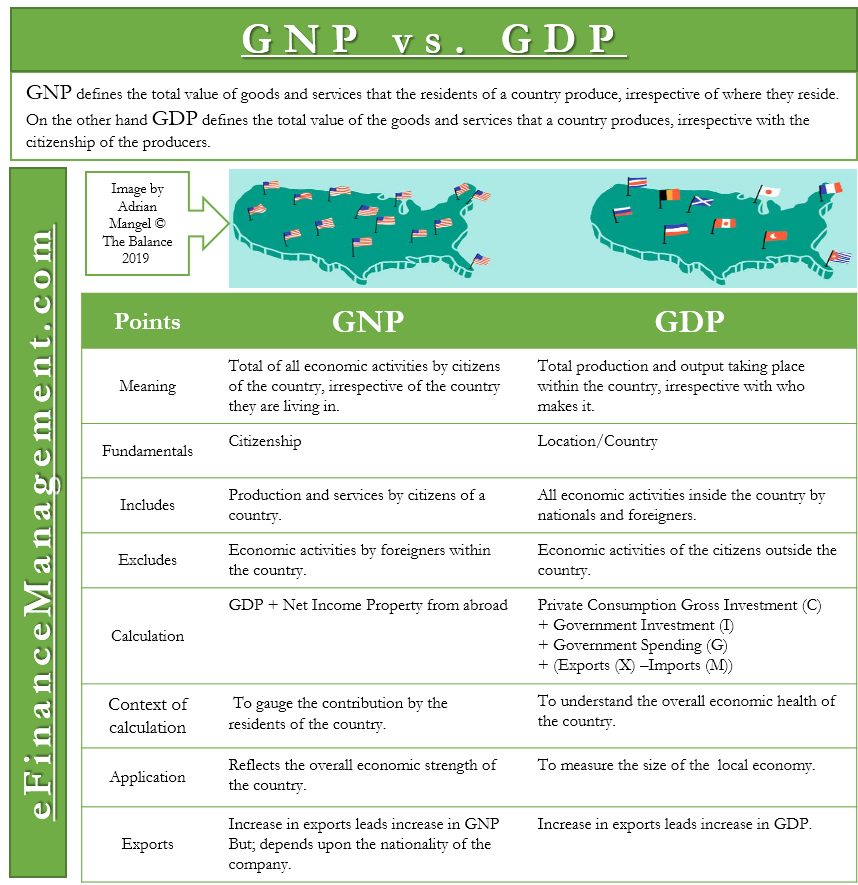Gross Domestic Product (GDP) and Gross National Product (GNP) are important measures that define the health of the economy. GDP defines the total value of the goods and services that a country produces. On the other hand, GNP defines the total value of goods and services that the residents of a country produce irrespective of where they reside. Even though both terms convey similar things, they are very different. However, people often use them interchangeably when talking about the economic health of a country. To better understand what both these terms mean and convey, we must know the differences between GDP vs GNP.
GDP vs GNP – Differences
Following are the differences between GDP vs GNP:
Meaning
To understand the activities, production, and output taking place within the country, we use the Gross Domestic Product. It considers all economic activities within the country, including from residents of other countries.
On the other hand, GNP takes into account GDP value along with the value of economic activities of expatriates and citizens outside of the country. In simple terms, GNP is the total of all economic activities by citizens of the country irrespective of the country they are living in. Thus, economic activity inside and outside the country becomes a major point of difference between GDP vs GNP.
Fundamentals
The core concept of GDP revolves around location. For GNP, it is basically citizenship. Similarly, GDP talks about productivity at a country scale, while GNP includes productivity at the international level.
Who are Included?
GDP includes all economic activities inside the country by nationals and foreigners. On the other hand, GNP includes production and services by citizens of a country.
Excludes
GDP does not consider the economic activities of the citizens outside the country. On the other hand, GNP does not consider economic activities by foreigners within the country.
Calculation
Following is the formula for calculating Gross Domestic Product:
Gross Domestic Product = Private Consumption Gross Investment (C) + Government Investment (I) + Government Spending (G) + (Exports (X) –Imports (M))
Since Gross National Product takes into account the value of economic activities of those who are not residents of the country as well, the formula for the same is:
Gross National Product (GNP) = GDP + Net Income Property from abroad
For instance, if a US company manufactures automobiles in the United Kingdom, the production will add to the UK GDP. But, if the US firm takes the profit and sends it to the shareholders in the US, then the amount will come in the US GNP as United Kingdom residents won’t benefit from this profit.
Also Read: Gross Income
Context of Calculation
The gross domestic product helps us understand the country’s overall economic health. On the other hand, economists use the gross national product to know how the nationals of the country are doing and what their economic status is. Governments and economists use the GNP to gauge the contribution of the residents to the economy.

Difference in Treatment of Certain Items
There are different situations or items that are treated very differently in the calculation of Gross Domestic Product and Gross National Product. Let’s review each of such situations:
Net income receipts of foreign companies operating in the country– as said earlier, GNP considers the economic value of all economic activity by the citizens of the country. Receipt from foreign companies under the ownership of foreign residents does not qualify for the GNP. Gross domestic product or GDP, on the other hand, does include the economic output in the country irrespective of who owns the company operating in the country.
Domestic residents owning companies and producing goods for global consumption – assume a case where a mobile manufacturing company produces smartphones for global consumption and remits the profits to the countries that have liberal corporate tax policies. Gross national product, in this case, will include the economic activity or remittance of profit to other countries. On the other hand, GDP is the measure of the economic output of the nation’s economy and does not consider the international activity, including the money remitted to other countries.
Net income from the foreign investment – while calculating gross national product, net income receipts from the international investments by the residents are taken into account. Gross domestic product, on the other hand, does not include this income.
Application
GDP helps to measure the size of the local economy, while GNP reflects the overall economic strength of the country. One can use these measures to study the average purchasing power, distribution of wealth, and more.
Exports
Usually, an increase in exports leads to an increase in both GDP and GNP. Sometimes, a jump in export may not increase GNP. This, however, depends on the nationality of the company. For instance, if a company where Google holds a 100% stake exports services worth $5 billion out of India. This $5 billion figure will come in the GDP, but not in the GNP as the export is by a US company.
Final Words
The gross domestic product holds more significance than the gross national product. The former metric gives a holistic picture of the total value of all economic activities in an economy. However, there is a criticism against GDP that it does not tell the economic well-being of society, such as the environmental impact of growth, infant mortality rates, and more.


Nicely explained